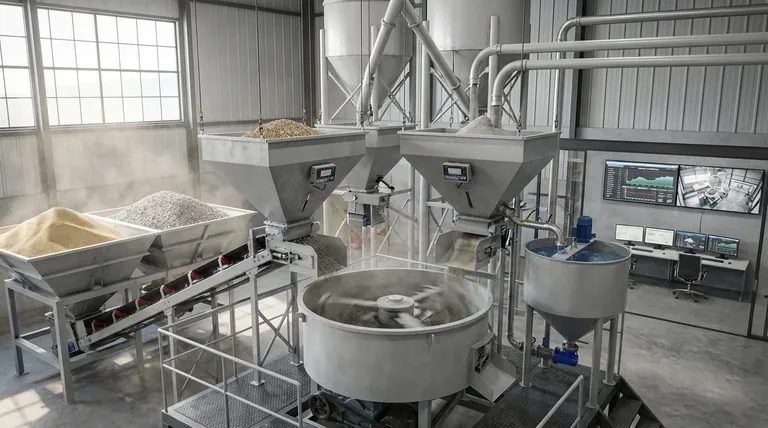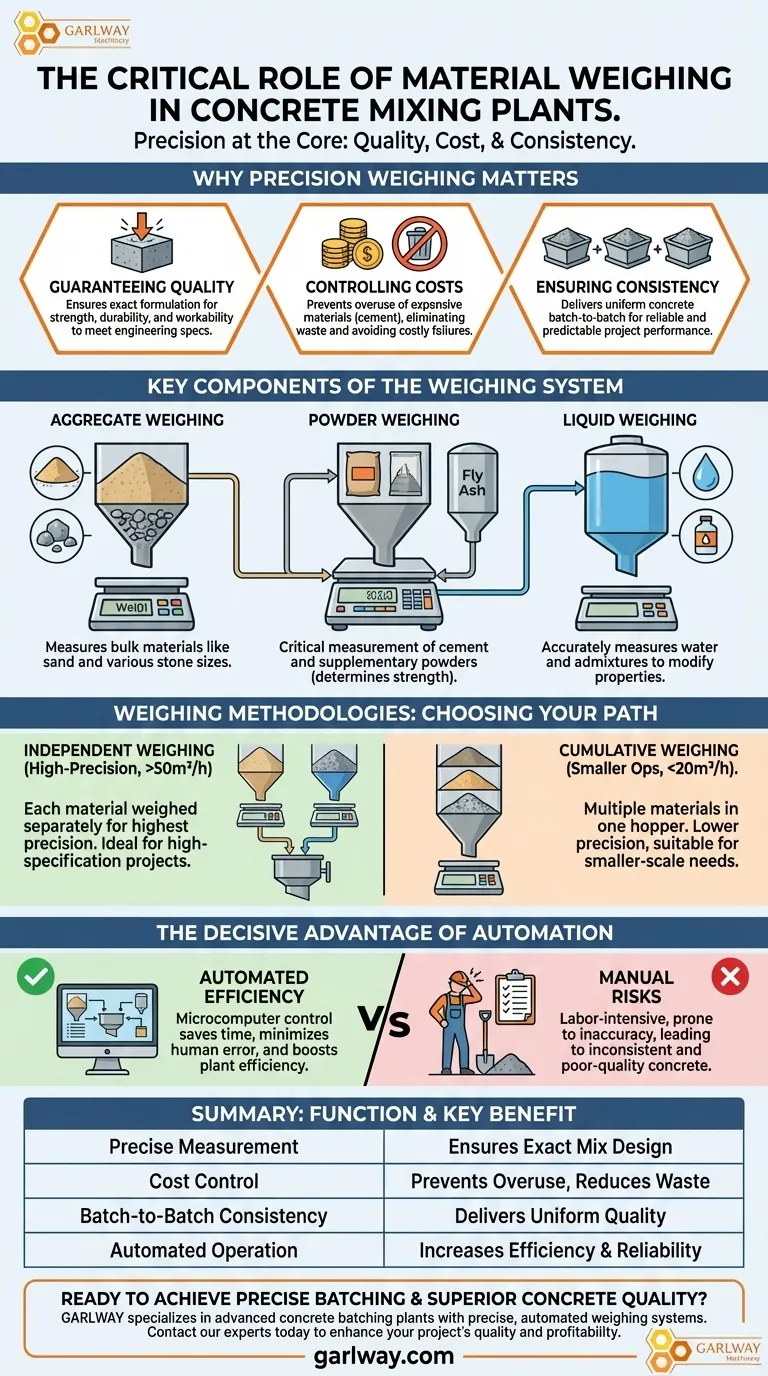At its core, the function of a material weighing system in a concrete mixing plant is to precisely measure every ingredient before it enters the mixer. This system ensures the exact formulation of aggregates (sand, stone), powders (cement, fly ash), and liquids (water, admixtures) to guarantee the quality of the final concrete and control production costs.
The weighing system is the quality control center of a concrete plant. Its accuracy is not just a technical detail—it directly dictates the structural integrity of the final product and the financial viability of the operation.

The Critical Role of Precision Weighing
A concrete mix is a precise chemical formula. Even small deviations in the weight of its components can have significant consequences for both quality and cost.
Guaranteeing Concrete Quality
The specific ratios of water, cement, and aggregates determine the concrete's strength, durability, and workability. The weighing system meticulously measures each component to match the predetermined mix design, ensuring every batch meets the required engineering specifications.
Controlling Production Costs
Materials, especially cement, are a primary cost driver. An accurate weighing system prevents the overuse of expensive materials, eliminating waste. It also prevents the underuse of materials, which would compromise quality and lead to costly failures.
Ensuring Batch-to-Batch Consistency
For any construction project, consistency is key. An automated weighing system, guided by a control computer, ensures that every single batch of concrete produced is identical to the last, providing predictable and reliable performance.
Key Components of the Weighing System
The system is typically divided into three distinct sub-systems, each handling a different type of material.
Aggregate Weighing
This component measures the correct amount of sand and various stone sizes. These materials form the bulk of the concrete mixture.
Powder Weighing
This is arguably the most critical measurement, as it involves weighing the cement and any supplementary materials like fly ash. The cement-to-water ratio is a primary determinant of concrete strength.
Liquid Weighing
This system accurately measures the water and any liquid chemical admixtures. These admixtures can modify the concrete's properties, such as setting time or resistance to freezing.
Understanding the Weighing Methodologies
The specific method used for weighing often depends on the size and output capacity of the concrete plant.
Independent Weighing for High-Precision Plants
In larger plants (typically over 50 cubic meters per hour), independent weighing is the standard. Each material is weighed in its own separate hopper using dedicated electronic scales. This method offers the highest level of precision and is essential for high-specification projects.
Cumulative Weighing for Smaller Operations
Smaller plants (often under 20 cubic meters per hour) may use a cumulative or superimposed weighing method. Here, multiple materials are weighed in the same hopper. For example, sand is added and weighed, then stone is added to the same hopper to reach a combined target weight. This method is less precise but can be sufficient for smaller-scale needs.
The Decisive Advantage of Automation
The shift from manual to automated weighing represents a fundamental improvement in concrete production.
The Efficiency of Automation
Modern weighing systems are fully automated and controlled by a microcomputer. This saves significant time and manpower, reduces the chance of human error to near zero, and improves overall plant efficiency.
The Risks of Manual Systems
Manual weighing is labor-intensive, physically demanding, and highly prone to inaccuracy. These inaccuracies can lead to inconsistent batches and poor-quality concrete, creating significant structural and financial risks. Automated weighing is the definitive standard for modern construction.
Making the Right Choice for Your Goal
The choice of weighing system directly impacts your operational capabilities and the quality of your final product.
- If your primary focus is high-volume production and stringent quality control: An independent, fully automated weighing system is non-negotiable for achieving the necessary precision and consistency.
- If your primary focus is small-scale projects with a lower initial investment: A cumulative weighing system can serve as a functional starting point, but you must accept the trade-off of lower precision.
Ultimately, viewing the weighing system as a critical investment in quality assurance is the key to producing consistently superior concrete.
Summary Table:
| Function | Key Benefit |
|---|---|
| Precise Ingredient Measurement | Ensures exact mix design for required strength and durability. |
| Cost Control | Prevents overuse of expensive materials like cement, reducing waste. |
| Batch-to-Batch Consistency | Delivers uniform concrete quality for predictable project outcomes. |
| Automated Operation | Increases efficiency and eliminates human error for reliable production. |
Ready to achieve precise batching and superior concrete quality?
GARLWAY specializes in high-performance construction machinery, including advanced concrete batching plants with precise, automated weighing systems. Our solutions are designed for construction companies and contractors who demand reliability, efficiency, and cost control.
Contact our experts today to discuss how our concrete batching plants can enhance your project's quality and profitability.
Visual Guide

Related Products
- Commercial Construction Mixer Machine for Soil Cement Mixing Concrete
- Ready Mixer Machine for Construction Ready Mix Machinery
- Portable Ready Mix Concrete Mixer Equipment
People Also Ask
- What are the advantages of concrete batching plant? Boost Quality & Efficiency for Your Project
- What are the common cement supply equipment for concrete mixing plants? Choose the Right System for Your Plant
- How are materials stored and transported in concrete plants? A Guide to Efficient Material Flow
- What are the maintenance tasks for the control system in a concrete mixing plant? Avoid Costly Downtime and Ensure Quality
- What are the advantages of the structural design of large and medium-sized concrete mixing stations? Superior Strength & Efficiency for Major Projects
- How much to start a cement plant? A Deep Dive into Costs and Strategy
- Why is a centralized lubrication system important in a concrete mixing plant? Prevent Costly Downtime & Mixer Failure
- How does the concrete mixing process work in a batching plant? Achieve Precision & Efficiency


